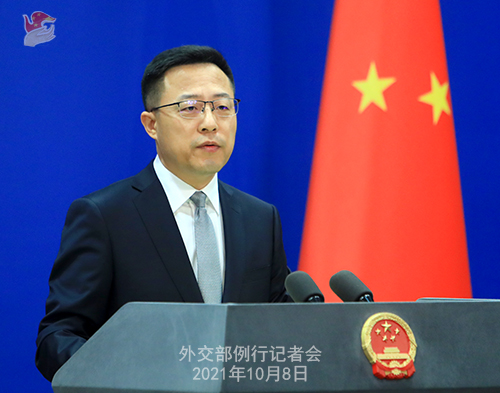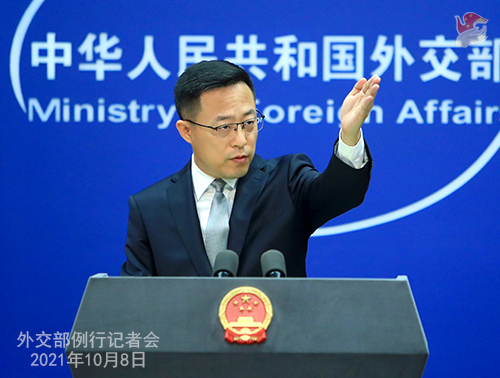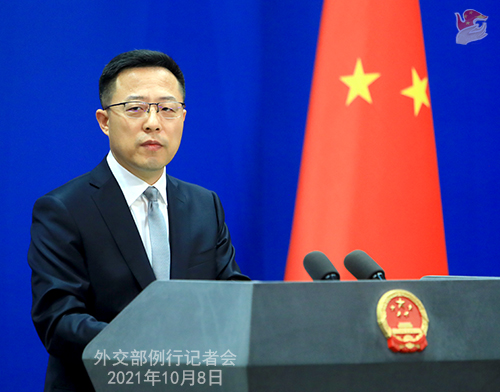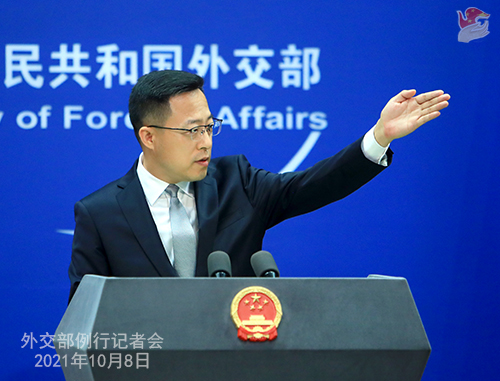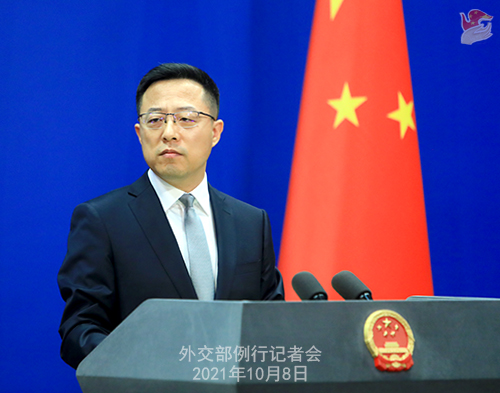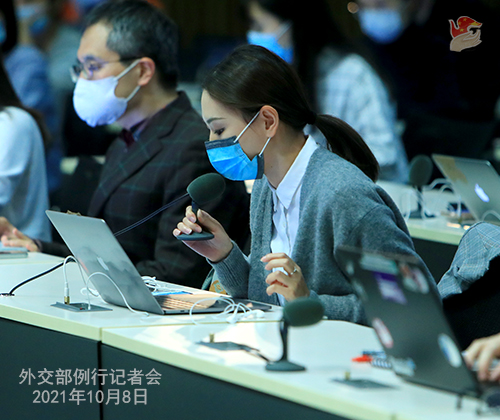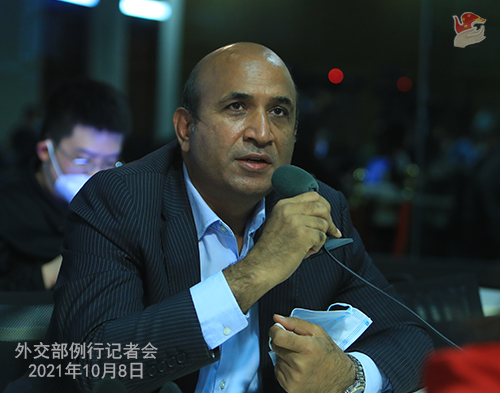| Foreign Ministry Spokesperson Zhao Lijian's Regular Press Conference on October 8, 2021 |
| 2021-10-08 20:54 |
|
Premier Li Keqiang will attend the opening ceremony of the 130th China Import and Export Fair and the Pearl River International Trade Forum and deliver a keynote speech in Guangzhou on October 14. CCTV: I wonder if you could provide any information on a possible meeting between the Chinese and US heads of state? Zhao Lijian: Following the spirit of the phone call between Chinese and US heads of state on September 10, Member of the Political Bureau of the CPC Central Committee and Director of the Office of the Central Commission for Foreign Affairs Yang Jiechi met with US National Security Advisor Jake Sullivan in Zurich, Switzerland. The two sides had a comprehensive, candid and in-depth exchange of views on China-US relations and international and regional issues of common concern. During their phone call on September 10, the two heads of state agreed to maintain frequent contact by multiple means. To act on their consensus, Director Yang Jiechi and NSA Jake Sullivan discussed during the meeting a video conference between the two heads of state before the end of this year. CRI: How does China see the recent meeting between Director Yang Jiechi and US National Security Advisor Jake Sullivan? How do you envision China-US relations after the meeting? Zhao Lijian: This high-level meeting was constructive, and conducive to enhancing mutual understanding. Director Yang Jiechi pointed out that whether China and the United States can handle their relations well bears on the fundamental interests of the two countries and two peoples, as well as the future of the world. When China and the United States cooperate, the two countries and the world will benefit; when China and the United States are in confrontation, the two countries and the world will suffer severely. The US side needs to have a deep understanding of the mutually beneficial nature of China-US relations and correctly understand China's domestic and foreign policies and strategic intentions. China opposes defining China-US relations as "competitive". China attaches importance to the positive remarks on China-US relations made recently by US President Joe Biden, and has noticed that the US side said it has no intention of containing China's development, and does not seek a "new Cold War". China hopes the US side could adopt a rational and pragmatic China policy, and, together with China, respect each other's core interests and major concerns, and follow a path of mutual respect, peaceful coexistence and win-win cooperation. Director Yang Jiechi expounded China's solemn position on issues related to Taiwan, Hong Kong, Xinjiang, Xizang and human rights as well as maritime issues, urging the US side to truly respect China's sovereignty, security and development interests, and stop using the above issues to interfere in China's internal affairs. The two sides agreed to take action, following the spirit of the phone call between Chinese and US heads of state on September 10, strengthen strategic communication, properly manage differences, avoid conflict and confrontation, seek mutual benefits and win-win results, and work together to bring China-US relations back on the right track of sound and steady development.
AFP: I have two questions. A Pentagon official has said that US Special Operations forces have been quietly training troops in Taiwan for months. How does Beijing react to this? The CIA has announced a new China-focused unit to counter alleged security threats from Beijing. How do you react to this? Zhao Lijian: On your first question, the one-China principle is the political foundation of China-US relations. China and the US established diplomatic relations on the premise of the three principles, namely, the US should sever "diplomatic relations" and abrogate the "mutual defense treaty" with the Taiwan authorities and withdraw US military forces from Taiwan. The US explicitly pledges in the China-US Joint Communiqué on the Establishment of Diplomatic Relations that it will "maintain cultural, commercial, and other unofficial relations with the people of Taiwan". The US should fully recognize the highly sensitive nature of Taiwan-related issues and the gravely detrimental nature of relevant issues, abide by the one-China principle and the three China-US joint communiqués, and stop arms sales to and military ties with Taiwan to avoid seriously damaging China-US relations and peace and stability across the Taiwan Strait. China will take all necessary measures to defend its sovereignty and territorial integrity. On your second question, this is a typical symptom of the Cold War mentality. Relevant US agency should view China's development and China-US relations in an objective and rational light and stop doing things detrimental to mutual trust and cooperation between China and the US and China's sovereignty, security and development interests. TASS News Agency: According to the US Navy statement, on October 2, US Navy nuclear-powered submarine USS Connecticut was damaged after it struck an unknown object while submerged in the waters of the Indo-Pacific region. According to media reports, the incident occurred in the waters of the South China Sea. Do you have any comments on this? Zhao Lijian: We are gravely concerned about the incident. As the party involved, the US should clarify in specific details what happened, including the exact location of the incident, the US side's navigation intention, the details of the incident, the object the submarine struck, whether the collision caused a nuclear leak or damaged local marine environment, etc. I would also like to stress three points about the incident. First, the US has long been making trouble in the South China Sea in the name of "freedom of navigation", which poses a grave threat and major risks for regional peace and stability. This is the root cause of this incident. Second, the US deliberately stalled and concealed the specifics of the incident without transparency and due responsibility. China and other countries surrounding the South China Sea cannot help but ask what truly happened and what the US intention is. Third, we can also see the following from this incident. The US and the UK recently decided to conduct nuclear submarine cooperation with Australia, a non-nuclear weapon state, and flagrantly proliferate nuclear submarines in the Asia-Pacific. This is bound to create nuclear proliferation risks, spark an arms race and undermine efforts to establish a Southeast Asia nuclear-free-zone. The odds of a nuclear incident will also increase dramatically. The US should abandon the obsolete Cold War zero-sum mentality and narrow geopolitical notions, and stop such erroneous practice that undermine regional peace, stability and development. Shenzhen TV: Russian Foreign Minister Sergey Lavrov recently said that by putting forward an Indo-Pacific strategy and creating the Quad mechanism and the AUKUS security partnership, the US intends to undercut the decades-old ASEAN-centered cooperation model. Such a strategy towards handling regional politics is aimed at openly containing China and undermining the existing system. Does the Chinese side have a comment? Zhao Lijian: That's very well-put indeed! Foreign Minister Lavrov's views reflect the shared concern of the vast majority of ASEAN countries. The US Indo-Pacific strategy, AUKUS and Quad are all closed and exclusive cliques informed by the Cold War zero-sum mentality with strong military security undertones. They will spur regional arms race, aggravate tension, and undermine regional unity and cooperation. The US practice of ganging up against a third party runs counter to regional countries' common aspiration to seek shared development through dialogue and cooperation and advance regional integration. It wins no hearts and has no future. Many ASEAN countries have questioned and opposed these moves to various degrees. The ASEAN-centered regional cooperation architecture is consistent with East Asian tradition and realistic needs. It is of great significance for enhancing regional countries' solidarity, cooperation and common development, and should be cherished and consolidated. Regional countries should be on high alert for any attempt to weaken and hollow ASEAN centrality and jointly reject all erroneous practices that violate international fairness and justice, create division and stoke confrontation in the region.
CCTV: Yesterday, during the UNGA First Committee (Disarmament & International Security) meeting, China and Russia issued a foreign ministers' Joint Statement on Strengthening the Convention on the Prohibition of the Development, Production and Stockpiling of Bacteriological (Biological) and Toxin Weapons and on their Destruction. Could you offer more information about the statement and China's position? Zhao Lijian: On October 7, during the general debate of the UNGA First Committee, the Chinese side, on behalf of China and Russia, read out the Joint Statement by State Councilor and Foreign Minister Wang Yi and Foreign Minister Sergey Lavrov on Strengthening the Convention on the Prohibition of the Development, Production and Stockpiling of Bacteriological (Biological) and Toxin Weapons and on their Destruction (BWC). This is the first time that China and Russia have released a joint statement on this issue. It demonstrates the high level of the China-Russia comprehensive strategic coordination in a new era as well as the two countries' strong determination and responsible attitude towards safeguarding global biosecurity and defending multilateralism. The Joint Statement mainly reiterates that the BWC is essential as a pillar of the international peace and security, and should be fully and effectively implemented with multilateral monitoring and verification mechanisms to be established as soon as possible. It also notes that military biological activities conducted by the US on and outside its national territory pose serious security risks for China, Russia, and other countries and relevant regions. The US has been the only one opposing the establishment of a verification regime for 20 years, which has led to growing international doubts. The statement urges the US to clarify its military biological activities at home and overseas and to stop obstructing the establishment of a verification regime. I would like to stress that the above-mentioned position of China and Russia also demonstrates the wide consensus of the international community. At the recently-convened BWC conference, more than 100 countries called for the resumption of negotiations for a verification protocol so as to establish a verification regime at an early date. However, the US alone has continued to resist the call in stubborn opposition to the entire international community. This has caused greater suspicion and concern from various sides. China and Russia, together with the international community, will remain committed to strengthening the BWC mechanism, work for substantive outcomes at next year's BWC Review Conference and constantly improve the global biosecurity governance system. The US should adopt a responsible attitude and earnestly address the international community's concerns to give the world confidence in its compliance with BWC obligations as a State Party. Associated Press of Pakistan: On October 7, at least 20 people were killed and over 300 injured following a powerful earthquake in Balochistan Province of Pakistan. Do you have any comment on that? Zhao Lijian: China has been following the situation closely in the aftermath of the earthquake in Pakistan. We mourn the victims, extend condolences to the bereaved families and express sympathy for the injured. China and Pakistan have a fine tradition of mutual assistance. We stand ready to provide Pakistan with timely assistance to the best of our ability based on its needs. China Daily: Ethiopia's new parliament held its first meeting on October 4, and the incumbent Prime Minister Abiy Ahmed was sworn in for a new term. Do you have any comment? Zhao Lijian: China extends congratulations on Prime Minister Abiy Ahmed's reelection. We believe that under his leadership, Ethiopia will continue to make new achievements in national development. Ethiopia is China's comprehensive strategic cooperative partner in Africa and an important participant in China-Africa cooperation under the BRI. Since the establishment of diplomatic ties more than 50 years ago, China-Ethiopia relations have maintained sound development with deepening political mutual trust and fruitful cooperation outcomes in various sectors. The Chinese side looks forward to working together with the new Ethiopian government to continuously scale new heights in our relations.
Beijing Media Network: At the initiative of China and African countries, 78 countries made a statement at the general debate of the Third Committee of the 76th session of the UNGA. They called for accelerated implementation of the Durban Declaration and Programme of Action and the elimination of racism, racial discrimination, xenophobia and related intolerance. Do you have any comment? Zhao Lijian: This year marks the 20th anniversary of the adoption of the Durban Declaration and Programme of Action. Due to the inaction and botched performance of a few countries including the United States, the international community still has a long way to go to eliminate racism, racial discrimination, xenophobia and related intolerance. Although Americans hold the truth to be self-evident that all men are created equal, racism and white supremacy are still spreading in the US. The COVID-19 pandemic further underlines systemic discrimination against ethnic minorities like people of African, Latin American and Asian descent in the United States. Anthony Fauci, the Director of the National Institute of Allergy and Infectious Diseases, said frankly that the health disparities amid the COVID-19 epidemic have shone a bright light on the American society's failings. Besides, there have been widespread police brutality and hate crimes targeting ethnic minorities, and deep-seated social inequality faced by vulnerable groups including women, children and the elderly. This has again torn to pieces the US disguise of "equality" and "freedom". A handful of countries, including the US, that are afflicted by chronic systemic racial discrimination, boycotted and were absent from the High-level Meeting of the UNGA to Commemorate the 20th Anniversary of the Adoption of the Durban Declaration and Programme of Action. This is irresponsible. If the US truly cares about human rights and is committed to realizing racial equality, it should redress its deplorable human rights record, eliminate the rampant racial discrimination at home, rather than sit idly by as radical ideas like white supremacy and hate towards ethnic minorities lead to new tragedies. Bloomberg: The US Trade Representative Katherine Tai is set to speak with Vice Premier Liu He soon. And at that time, she is expected to mainly stress China's shortfalls in trade under the trade deal that was struck between the former President Donald Trump and China. My question is, does the foreign ministry have a comment on recent efforts to reengage on the trade issue between US and China? And specifically, the term "re-coupling" was mentioned by Tai. What's the foreign ministry's understanding and view of this term "re-coupling"? Zhao Lijian: I'll refer you to the competent department for specific issues relating to China-US economic and trade relations. In principle, I'd like to stress that China-US economic and trade relations are essentially mutually-beneficial. There is no winner in a trade war. Issues in bilateral economic and trade relations should be properly dealt with in the spirit of mutual respect and equal-footed consultation. We hope the US will work together with China for the sound and steady development of the bilateral economic and trade ties. The formation and development of global industrial and supply chains is the result of both market law and choices of the business community. Artificial industrial "transfer" and "decoupling" runs counter to the law of the economy and objective reality. It cannot solve domestic problems and will only seriously undermine the stability and security of global industrial and supply chains. Cooperation and dialogue instead of decoupling and confrontation is the strong aspiration of various sectors in both China and the US, including the business community. The US should heed these calls and do more things conducive to the sound and steady development of China-US economic and trade ties. AFP: A French senator visiting Taipei has referred to Taiwan as a "country". How does Beijing view the visit by the French delegation to Taiwan? Zhao Lijian: There is only one China in the world and Taiwan is an inalienable part of China's territory. Referring to Taiwan as a "country" is a flagrant violation of the consensus of the international community, France included. People like Alain Richard either lack basic respect for and knowledge of norms governing international relations, or attempt to hijack state-to-state relations out of selfish agenda. China expresses strong condemnation and firm opposition to this. We hope France can earnestly abide by the one-China principle and avoid sending wrong signals to the "Taiwan independence" forces.
CCTV: The Afghan Taliban said in a statement on the 20th anniversary of the US' invasion of Afghanistan issued on October 7 that the US invasion over the past 20 years has resulted in nothing but casualties and countless financial losses. They hope that the UN, the richest countries in the world and various other organizations will lend a helping hand to the Afghan people, and not use their aid and assistance as a tool of political pressure. Do you have any comment? Zhao Lijian: US troops entered Afghanistan in the name of counter-terrorism 20 years ago, and started its two-decade-long military intervention and occupation. It undermined Afghanistan's sovereignty, independence and socioeconomic development and also caused a humanitarian disaster there. According to academic assessment, the war in Afghanistan claimed an average of 250 lives on a daily basis. According to the Office of the Special Inspector General for Afghanistan Reconstruction, from the start of the war, more than 100,000 Afghan civilians were killed by US troops, hundreds of thousands were injured, and tens of millions became refugees. Historical records and facts have proven that what the US has done in Afghanistan is out of selfish interest. It is for selfish interest that the US waged the war. It is for selfish interest that the US kept its troops stationed in Afghanistan. It is also for selfish interest that the US initiated a reckless troops withdrawal. Now the Afghan people have a window of opportunity to realize peace and start reconstruction. The international community should, on the basis of respecting Afghanistan's sovereignty, independence and territorial integrity, support the Afghan people in taking control of their own destiny, and help Afghanistan maintain stability, prevent chaos and realize sound development. As the culprit of the Afghan issue, the US cannot shirk its responsibility for peace and reconstruction in Afghanistan. It should be responsible for what it has done in the past two decades, and cannot simply walk away and shift the responsibility for reconstruction to the international community. More importantly, the US should change its misguided old habits of wantonly resorting to military interference in other countries and imposing its own will on others to avoid the repetition of the tragedy that has claimed and ruined so many lives. RIA Novosti: Russian President's special representative on Afghanistan Zamir Kabulov said yesterday that Moscow plans to hold international talks on Afghanistan on October 20. I wonder if China has received an invitation to this meeting and who will represent China there? Zhao Lijian: China supports all international efforts that are conducive to promoting peace and stability and gathering consensus in Afghanistan. The Chinese side has received Russia's invitation. We stand ready to maintain communication and coordination with relevant sides including Russia. Beijing Youth Daily: According to reports, Guinea's interim president Mamadi Doumbouya appointed Mohamed Beavogui the interim prime minister on October 6. Does China have any comment? Zhao Lijian: We noted the recent important progress in advancing domestic political transition made by various sides in Guinea. It is China's hope that relevant sides in Guinea will keep up dialogue and consultation, and strive to maintain overall national stability and development with the support of regional and international organizations. China and Guinea have a traditional friendship. We stand ready to work together with Guinea to constantly develop our friendly cooperative relations.
Phoenix TV: US President Joe Biden said that he has spoken to Chinese President Xi Jinping about Taiwan and they agreed to abide by relevant agreement concerning the Taiwan question. Can you confirm that this was part of the conversation between the two sides? Zhao Lijian: China's position on the Taiwan question is consistent and clear. The one-China principle is the political foundation of China-US relations. On the Taiwan question, the United States has made clear commitments to China. In his phone call with President Xi Jinping, President Biden made it clear that the United States has no intention to change the one-China policy. We urge the US side to earnestly abide by the one-China principle and the three China-US joint communiques, translate relevant commitments into concrete action, prudently and properly handle Taiwan-related issues, and avoid sending wrong signals to the "Taiwan independence" separatist forces, lest it should seriously damage China-US relations and peace and stability across the Taiwan Strait. During his meeting with US National Security Advisor Jake Sullivan in Zurich, Switzerland on October 6, Director Yang Jiechi once again expounded China's solemn position on issues related to Taiwan, urging the US side to truly respect China's sovereignty, security and development interests, abide by the one-China principle and the three China-US joint communiqués, and stop using Taiwan-related issues to interfere in China's internal affairs. The US side expressed its adherence to the one-China policy. NHK: First question, on October 10 the Tsai Ing-wen authorities will hold a military drill. Do you have any comment? Second question, a large number of Chinese military aircraft entered the Taiwan authorities' so-called "air defense identification zone" this month. What's the purpose of this? Zhao Lijian: Neither of your questions is about foreign affairs. I would refer you to the competent departments. Kyodo News Agency: Japanese Prime Minister Fumio Kishida delivered his first policy speech on October 8, in which he said that building a stable relationship with China is important and that dialogue should be maintained to jointly address shared problems while urging China to take responsible actions. What is China's comment? Zhao Lijian: China and Japan are each other's important and close neighbor and cooperative partner. As important countries in the region, the two countries share expansive interests and broad space for cooperation. We hope the Japanese side can work with China, abide by the principles set out in the four political documents, follow the spirit of learning lessons from history to embrace the future, step up dialogue and communication and boost mutual trust and cooperation, so as to jointly promote sound and steady development of China-Japan relations in the right direction. Bloomberg: Just to go back to the President Biden-President Xi summit which you mentioned would happen before the end of the year. Do you have any more specific details in terms of the time frame? And what might be on the agenda and the format of that meeting? Do you have any more details about that? Zhao Lijian: I just clearly elaborated on China's position and have no more information to share at the moment. Reuters: US Secretary of State Blinken said that the US wants China to act responsibly when it comes to addressing the potential impact of China Evergrande Group's financial crisis. Do you have any comment on Blinken's remarks? Zhao Lijian: I have noted relevant reports. I would refer you to competent authorities for your specific question. I want to stress that China has always adopted a responsible macroeconomic policy and is committed to promoting high-quality development. In recent years, the Chinese economy has become an important engine and stabilizer of world economic growth, contributing around 30 percent to global economic growth for years in a row.
|
| |||||||||||||
| |||||||||||||
